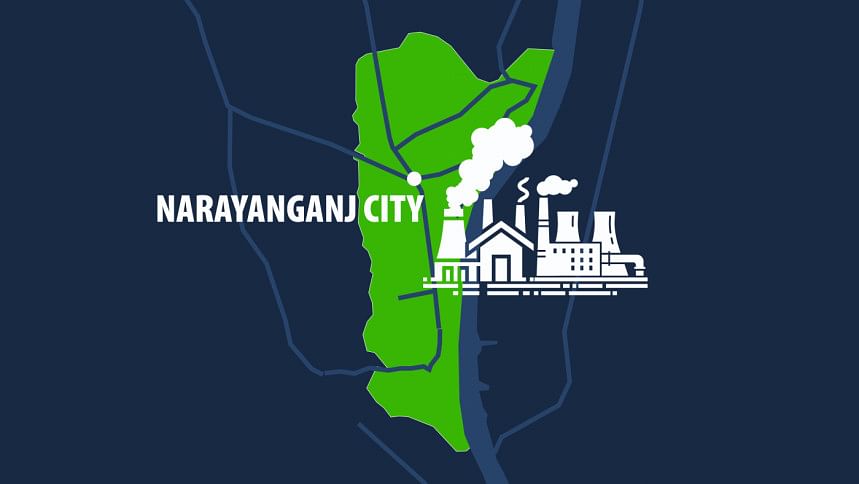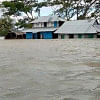Narayanganj 1st Bangladeshi city to adopt urban climate action plan

Narayanganj has become the first city in Bangladesh to adopt a climate resilient development plan.
Narayanganj City Corporation approved the action plan for low-carbon, climate-resilient development, supported by ICLEI – Local Governments for Sustainability, in April, according to Reuters.
ICLEI is an international NGO that promotes sustainable development. The organisation provides technical consulting to local governments to meet sustainability objectives, the Reuters report adds.
The NCC approval made Narayanganj the first Bangladeshi city to adopt such a plan, Reuters reports quoting Jubaer Rashid, Bangladesh representative for ICLEI South Asia.
"We assessed the vulnerability of the climate-impacted urban systems like energy, water supply, waste management and so on, and came up with realistic recommendations for the city to implement," he said.
The setting up of air-quality monitoring systems by Narayanganj city administration, with help from ICLEI, have already been completed, he added.
The system will detect and measure polluting gases like carbon monoxide, nitrogen dioxide and sulphur dioxide, as well as particulate matter, with real-time data displayed on public screens, according to Reuters.
ICLEI is also encouraging renewable energy adoption in the city. It has set up rooftop solar power systems at some public facilities including a public library and a hospital, the report adds.
But as central government agencies are charged with delivering public services nationwide, cities have limited authority over policies and actions to tackle climate change in Bangladesh, Reuters adds.
Municipalities need backing from central government to roll out their plans, according to Rafiur Rabbi, leader of the Citizens' Committee, a local movement working on social and environmental issues.
The Department of Environment, for instance, enforces regulations on emissions and effluent management, while district deputy commissioners allocate land to factories, he said.
On the water works front, Narayanganj City Corporation has been working to restore 26 canals in phases. The restoration is expected to tackle pollution, boost vegetation and enable inhabitants to get around more easily, the Reuters report adds.
"Water bodies also reduce the heat island effects in urban areas through evaporation," said environmental engineer Dipak Bhowmick, ICLEI's project officer in Narayanganj.
The Shitalakhya river, however, has been damaged by dumping of untreated industrial effluents and municipal waste in its water, decimating biodiversity and making it "biologically almost dead", said local journalist Golam Rabbani.
The city corporation is working to build eco-parks – ecological zones including forests, wetlands and recreational green spaces – along the banks of the main river and canals to protect water bodies and address climate change, Narayanganj Mayor Salina Hayat Ivy told Reuters.
Reducing river and canal pollution could also help ease growing pressure on underground aquifers as residents sink tube wells to extract clean water for their own use, she also said.
Insufficient finance is the key constraint to Narayanganj's efforts to pursue a climate-smart development model, said Mayor Ivy.
The city corporation's annual budget for 2021-22 is about $80 million, while in Rajshahi – which has less than half the population but is the main city of its administrative division northwest of Dhaka – it is more than $120 million.
"We need a larger budget," said Ivy, noting Narayanganj's outsized contribution to the national economy.
ICLEI is working closely with the city corporation to formulate project proposals that include climate concerns and pitch them to global development organisations for funding, said ICLEI South Asia project officer Bhowmick.
The World Bank, Japanese government and Asian Development Bank are among those that have funded projects in Narayanganj city.
Moinul Islam, town planner for Narayanganj City Corporation, urged other government organisations working there, such as the Department of Environment and the Bangladesh Inland Water Transport Authority, to coordinate their activities with the city's sustainable development aims.
ICLEI country head Rashid said Narayanganj would serve as a pilot for low-emissions urban development in Bangladesh. Rajshahi is the second city to approve and start implementing a climate action plan, but there are no others as yet, he noted.
The southwestern port city of Mongla, meanwhile, has made some progress, with Bangladeshi organisations helping it craft a strategy for infrastructure to prevent flooding, as well as opportunities for climate migrants.
"The example of Narayanganj will demonstrate how local governments could play a role in realising the goals of the Paris Agreement on climate change," Rashid said.

 For all latest news, follow The Daily Star's Google News channel.
For all latest news, follow The Daily Star's Google News channel. 








Comments